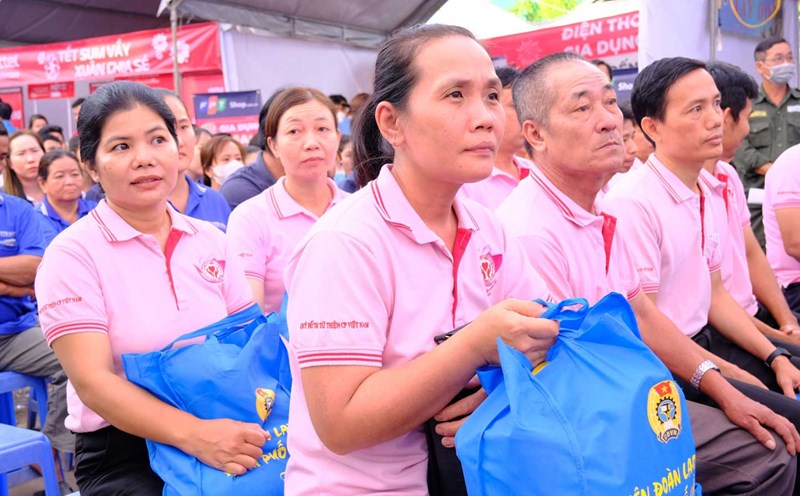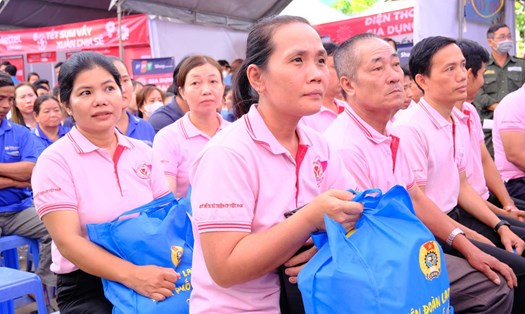In Dong Nai province, an estimated 50,000 - 60,000 people have moved to other provinces. At the end of 2024 and the beginning of 2025, despite many orders, many businesses still cannot recruit enough workers.
To retain and get employees back to work after the 2025 Lunar New Year holiday, many businesses have announced benefits both before and after Tet.
According to Mr. Ngo Ngoc Thuan - Deputy Director of Dong Phu Cuong Joint Stock Company (Dinh Quan district), there are about 2,500 employees. In addition to announcing Tet bonuses early, the company also offers a bonus policy for workers who work on the opening day of the year (February 5, 2025) of 300,000 VND/person. For 7 consecutive working days at the beginning of the year, including the opening day, it is 1 million VND/person, equivalent to a total amount of nearly 2.5 billion VND.
This policy encourages employees to return to work on time and creates a happy atmosphere for all employees in the company in the first days of spring. According to the company's representative, the company's current orders ensure regular employment for employees and is recruiting more workers to serve production.
At TKG Taekwang Vina Joint Stock Company (Bien Hoa 2 Industrial Park, Bien Hoa City), the union supports bus fares when workers return to work after Tet.
Mr. Dinh Sy Phuc - Chairman of the Trade Union of TKG Taekwang Vina Joint Stock Company - said that in order to create conditions for workers to return to their hometowns to celebrate Tet with their families by safe means of transport, avoiding the situation of being overcrowded and affecting their health, the trade union organized buses for workers to return to their hometowns to celebrate Tet on January 25, 2025 (ie 26th of Tet) and return to the company on February 4, 2025 (7th of Tet).
Accordingly, the company will support 50% of the return ticket to the company, and workers who buy a one-way ticket will be supported 30% of the ticket. Workers in difficult circumstances will be given one-way tickets through union programs.
Union officials said that businesses that want to stabilize their workforce and develop sustainably need to create motivation for employees to stay long-term. In particular, the Tet bonus policy is one of the decisive factors in retaining employees.
Currently, in many enterprises, grassroots unions are trying to negotiate with business leaders to achieve the same Tet bonus as last year, at least one month of basic salary for workers, and at the same time, plan to support round-trip bus tickets for workers to return home to celebrate Tet with their families.
In addition to grassroots unions, unions at higher levels directly above the grassroots level have many policies to support workers. Ms. Tran Thi Hong Thao - President of the Trang Bom District Labor Federation - also said that 2,000 bus tickets will be provided to take union members and workers home to celebrate the Lunar New Year 2025. The beneficiaries are union members and workers who have worked for at least 1 year in agencies, units and enterprises in the district, are in difficult circumstances and do not have the conditions to return home to celebrate Tet with their families.
The support is carried out in two forms: organizing buses to take workers home for Tet and providing cash support. Union members and workers are supported in two ways from Dong Nai to other provinces and cities and vice versa.
The buses to take workers home to celebrate Tet At Ty 2025 will depart in the afternoons, starting from January 19, 2025 to January 24, 2025 (ie from December 20 to 25 of the lunar calendar).
In addition, Trang Bom District Labor Federation also organized cultural nights, gave gifts to disadvantaged workers, and visited rented rooms and gave gifts to workers celebrating Tet away from home.
According to the Dong Nai Provincial Federation of Labor, the province has more than 1.3 million workers, of which workers from other provinces account for about 60%. Since the COVID-19 pandemic, a large number of workers have moved from Dong Nai to other provinces, estimated at about 50,000 - 60,000 people, mainly concentrated in the South Central, Southwest, and Central Highlands provinces.












